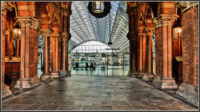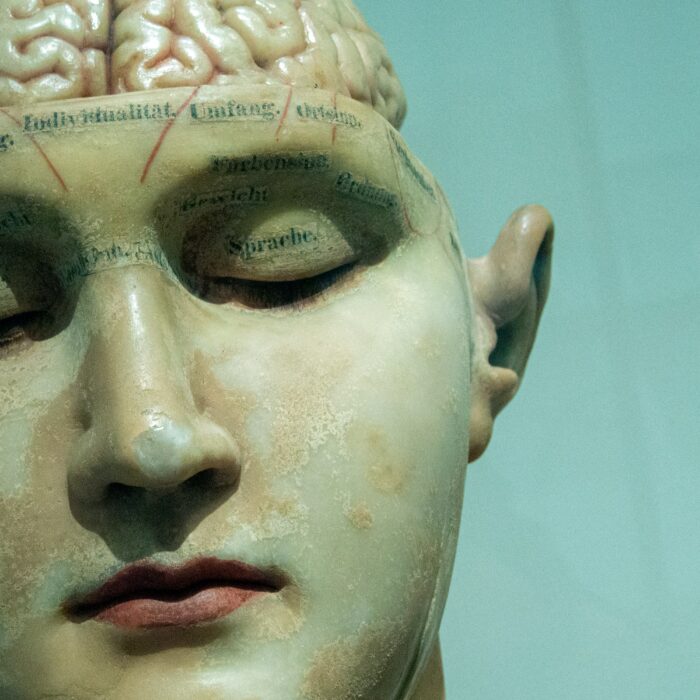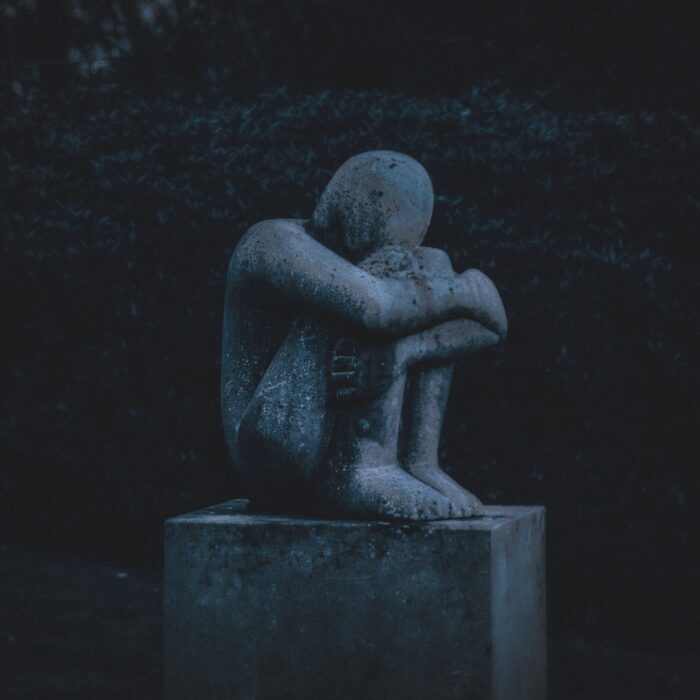You have no items in your cart. Want to get some nice things?
Go shoppingI hadn’t been on the Eurostar for years, not since it first opened at Waterloo, in fact, but last October I took the opportunity to travel to Paris by train instead of taking the short-hop from Gatwick. I was there to conduct an interview in a swish hotel with some Captain of Industry or other for The Economist, all expenses paid. When I arrived at the new station, briefcase in hand, I was alarmed by what I saw. Unlike the grotty, smokey South London terminus, the gleaming concourses of St Pancras, with their underground malls and champagne bars, seemed like some strange consumerist dream to me. A hallucination of Tokyo – all sushi and chrome: very un-English. The new gateway to Europe left me slightly disorientated; giddy, as if I had just traversed a savagely over-designed Duty Free lounge. So I was surprised and relieved, when we got going, to find my old friend from the Red Tops, Alistair Enright, sitting just along the aisle in the half-empty carriage.
‘David – hey!’ Alistair shouted across the seats, his long nose twitching like an ant-eater, a facial feature I always thought apt for an investigative journalist. ‘Long time no see! What takes you to gay Paree? Business or pleasure?’
‘Bit of both, I hope.’
The latter wasn’t strictly true, as there would be little time for any enjoyment of anything. These assignments were always In-and-Outs, as my female editor referred to them, with none of the innuendo that someone like Alistair might’ve given the phrase.
As the sleek train hissed away from its buffers, Alistair’s lanky frame joined me in the empty seat across the aisle, where he immediately began discoursing in his characteristic way, with scurrilous intensity, about the newspaper trade and the crisis it currently faced. Nobody was buying ink and paper, he moaned. Like with everything else – from films to music to sexual titillation – people were downloading it for free from the internet. ‘At least in the old days you had to brave the local newsagent to reach the top-shelf!’ Alistair thundered.
Axiomatic as most of this was, Alistair was as stimulating a companion as one could wish for on the soulless Eurostar, so I settled down to listen while watching the contours of Kent blur past in the drizzle. Track-side, the trees and hedgerows were almost totally stripped, with tatters of butterscotch maple leaves swept into huge rain-sodden mounds. In the distance, the buildings hidden, a number of cottage chimneys emitted comforting plumes of smoke.
As we talked about the economic downturn, the death of the print media, his family, the terrible weather, and, inevitably, women, Alistair turned to the speeding window and indicated the conurbation fast approaching on our left-hand side.
‘Folkstone.’
‘Really? This thing’s quick’
Then he leant forward. ‘Remember Matt?’
‘Who?’
‘Matt Cheetham.’
Matt was Alistair’s friend from his apprentice days, a drop-out and wannabe musician, whom he had briefly called his best friend. I had never trusted Matt – a cocksure Northerner with an upright, almost priapic gait, but had spent many nights drinking with him and Alistair in the warren of pubs and bars behind Fleet Street.
I tried to force a note of interest into my voice. ‘What’s he up to then?’
Alistair gestured towards the Edwardian facades of Folkstone, their seedy glamour intensified by the rain. ‘He moved here after he married Denise. Had a right old time of it, so I’m so told.’
‘Go on . . .’
‘Well, just like Matt – ever the opportunist – he wants to ride the wave of the buy-to-let boom. So he uproots his fiancée from her nursery job, sells his perfectly good house in Bromley and buys one of those basement flats that used to be the servants’ quarters of a grand house.’
‘When was this?’
‘Around three years ago.’ Alistair replied, a grim and knowing look directed at me over his considerable nose.
Matt Cheetham was one of those people who seemed to have survived into their forties without ever having held down a substantial job. He was funny – but then the talentless and deluded are always funny. And he was strange company too. A hearty Celt, with a pasty complexion and knotted red hair, he had one sincere eye and one wildly equivocal eye. It was always hard to know which to make contact with first. Sometimes your gaze flicked back and forth from one to the other, trying to get the measure of this shallow, yet fathomless, man. And Denise was a conundrum too. Slightly built, her face peeping from between curtains of ebon hair, his wife was just one whisker from being outright rude. She had a silent, scheming presence. A total lack of social grace or effort.
Come to me, she seemed to say, and I will sound you out against measures and values known only to my inner self. This imperative repelled one and dragged one in at the same time. They were an odd, childless, socially inept couple. Like the Macbeths.
‘What was Matt up to at the time?’
‘Pissing about with music, as usual. Still trying to be a rock star, aged forty-five. The idea was he and Denise do up this basement, then flog it when the Channel Tunnel link re-opened in ‘09. Didn’t take into account the biggest financial crash since the Great Depression.’
‘They still sold at a profit, though?’
‘Er, not exactly. Here’s what happened. Or what he told me, anyway . . . Firstly, Denise doesn’t like the area. Hates the sea, the seagull shit, the stink of fish and chips. Hates the fact that her friends – or most likely, her mum – are miles away. Hates Matt for dragging them to what, for a lifelong Bromley girl, is the ragged ends of the earth. Plus, she has no job, and he has no money. So they spend their days in dungarees painting the endless ceilings. Those Edwardians built places big, as you know: even the servants’ quarters were gianormous. What Matt and Denise had, in effect, was a four-bedroom ground-floor flat with garden – a zinger of a property, as Matt planned on describing it when it finally came on the market.
‘But Denise despised it . . . Despised the very walls they spent days re-plastering. Then, without warning, strange things began to occur. One evening, according to Matt, when they were watching Strictly, he goes into the kitchen to fetch another bottle of wine – he could drink for England, as you recall – only to find a fresh bottle of white already out on the worktop, corkscrew stuck in the top, “Like a knife in a body,” as he related it to me. Now, this wouldn’t be strange, if not for the fact that neither of them had shifted from the sofa for the past hour. He goes back in, and, very gingerly checks the temperature of the bottle with the back of his hand, to see if it’s semi-warm. But no: it’s stone-cold, straight from the fridge, the lead in a little coil next to it. So he barges back and asks Denise if she took a bottle of Tesco’s Sauvignon out. ‘Nope,’ she replies, she’s been right there next to him all the time. So he returns and fetches, with trembling hands, the unopened bottle and shows it to her. Pissed, she thinks. He’s having a laugh . . . Then she’s genuinely astonished. How did it happen?’
‘How did it happen?’
‘Exactly. It was a mystery that taxed them for days until other strange things began occurring. This time to Denise. Coming back from a depressing visit to the shops – it was February, out of season , the whole place a dump – she goes to the bathroom, sits down on the loo, only to see that someone, or something, has squirted toothpaste all over the shop. Emptied the whole tube. Over the mirror. On the walls. In the bath. Even on the bog-seat where she’s sitting . . . So she calls Matt, who’s up north somewhere, singing at Butlins, or whatever he did for a living then, in hysterical tears. They’ve had a burglary, she squeals . . . He tells her to check the doors, the windows. But they’re all intact. No sign of forced entry anywhere. And nothing stolen. So freaked out is she, Denise takes the train to her mum’s and stays for a week.
‘Now Matt, if you remember, was a bit Alpha – he had to be the stud duck on the pond. He always got Denise to do his bidding at least – though I think she secretly loved being his little hausfrau, ironing his shirts and packing his sandwiches for his gigs. Well, can Matt get her to come back? Can he fuck! He’s lost his alpha leverage. So he has to physically return to Bromley, prise her from her mother’s sofa, and drive her back to Folkstone, where they inspect the toothpaste-spattered bathroom, just as she left it.’
‘I would have been as terrified as Denise.’
‘You would, would you? Well, taken soberly, these weren’t terrifying incidents. But far odder occurrences were to happen the following week.’
‘I’m developing a theory here . . .’
‘Save it. When Matt and Denise came back from town on Sunday, they found the bed, which they had left strewn with the Sunday papers and marmalade blobs, miraculously made – the Telegraph in a neat pile, the plates in the sink. Welcome, maybe, but no explanation supplied. Very unsettling. Then come the noises – a persistent humming or thrumming like keys being cut, seemingly originating upstairs. But when they tramp up to the first floor, they find the flat is empty. Been on the market for months apparently . . . Then, to make things worse, there’s the smell -’
‘Poltergeist,’ I interrupted. ‘Has to be. Although, of course, they don’t exist.’
A picture of Folkstone was forming in my mind as Alistair spoke – one of grey, wave-lashed coastal paths; bandstands with dive-bombing gulls. And, behind this, spacious empty flats, with wide corridors and endless bedrooms, where strange nameless humming could be heard in the quiet of empty afternoons.
‘Well, that’s what they began to fear, once they changed all the locks and added a security gate.’
‘What about this smell?’
‘According to Matt, it was a sour, salty stink like old soy sauce. All pervasive. It would be in their nostrils on waking up; permeating their evenings of serious wine-drinking; their Sunday cooking of hearty joints. And neither could figure out where it came from, or what it actually was. At one point, Denise became hysterical that it was the smell of blood . . .’
‘My God!’
‘But their nameless tormentor – or tormentors – wasn’t without humour. By now, Denise was convinced it was the ghost of one of the tireless servants, a matronly chef maybe, wanting to reclaim her space. They went into the kitchen one morning to find the cutlery drawer everywhere. This would keep happening every week, until Denise found a way of arranging the silverware to the ghost’s approval. A breakthrough, she told Matt – or at least some kind of progress. However, she still wanted out. But Matt was adamant they should stay put until the end of the year, that they must finish the renovation, then put the place on the market.’
‘Was the knives and forks business the proverbial last straw?’
‘Nah, that would be the face in the bathroom window. One night, not long after Matt had vetoed the idea of their returning to Bromley, after he claimed he could put up with any amount of ghost trouble, Denise paid a visit to the loo only for him to hear a blood-curdling scream on locking the door. A face – a looming, shadow-like visage of an old hag – had appeared in the square of window, which they both knew was impossible to access from outside unless you scaled barbed wire or had a key to the security gate. That was the last straw, though the business was not without a postscript.’
‘Didn’t Matt tell anyone else about all this?’ I asked. ‘His friends?’
Now I was recalling more than I wished about Matt and his depressing life. He was one of those blokes who didn’t have real friends, but lackeys – muckers from school, musos from his various bands, cronies. The secret dissipation of his life was clammy to the touch: up to three bottles of wine per night, and days spent buggering around in his home studio. Then there were the places of low resort he took his musicians; the women he cheated on Denise with; the tax doges and endless schemes and scams – anything to avoid doing an honest day’s labour. During those long Fleet Street evenings, the fact of how Matt had lived so long and to so little purpose was a horror to me. What had he done with all those years? Where had he put them? The old goat was nearing fifty, without a substantial job or anything you could call an achievement. There was something flabby, wasteful, wilfully depressing, obscene about the way he had squandered his days.
‘He didn’t have many mates, if you recall. Said he didn’t need ‘em. By now he was calling himself a Property Developer, as he attempted to ride the buy-to-let Klondike.’
‘So what happened to the spooky old hag? And I don’t mean Denise. How did it resolve itself? If it ever did?’
‘With an exorcism.’
‘You’re kidding me!’ I sat forward in my seat, suddenly aware of my own reflection in the dark glass of the train’s window. We had been deep underground for some time now, the train silently gearing up to maximum speed, without us feeling any tangible increase in velocity. The gothic weather of late October was gone from view, and I secretly longed to walk around again in its ragged rain.
‘No shit. Matt roped in the local pastor and they had the full Monty. Candles. Invocations. Latin. By now he believed in all of it. Had converted from a sceptical atheist to a sighter of UFOs.’
‘Did it work?’
‘Did it hell! A week later, the hordes of ghosts, noises and stinks were back with a vengeance. Matt finally cracked and scurried back to Bromley with his tail between his legs, Denise in tow. Not so much a Property Developer but a developer of silly superstitions, and a religious convert. They ended up renting, a mile away from their perfectly good old house. The economy crashed and they sold the cursed Folkstone flat at a loss.’
‘Jesus . . . You don’t think Denise made it all up to force his hand?’
Alistair shrugged. He was looking subdued, serious now, as the train approached maximum speed. ‘Who knows? It was a pretty elaborate ruse is she did. What do you think?’
‘I guess . . . I guess we’ll never know.’
But I wasn’t thinking about Matt and Denise by now. I was ruminating on all that was hidden from us. The mysteries of science, of the soul, of what really goes on. The real unseen. The invisible date of our own death – hiding from us, but existing, nonetheless, past the barrier of time.
We were in the darkness now, and would remain there until we emerged – surreally – at the Gare du Nord. Another country, with my contact from The Economist waiting invisibly among the crowds.

About Jude Cook
Jude Cook lives in London and studied English literature at UCL. His first novel, BYRON EASY, was published by William Heinemann of Random House in February of 2013. He has written for the Guardian, the Spectator, Literary Review and the TLS. His essays and short fiction have appeared in Litro, Structo, Long Story Short and Staple magazine.





